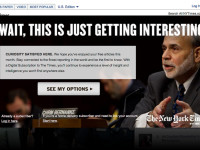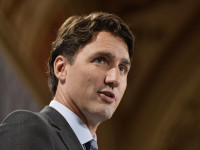Last week, I had the opportunity to deliver the keynote address at a Centre for International Governance Innovation (CIGI) panel on the TPP. My talk, which begins at 4:25 and runs until 41:00, focused on the digital policies within the massive agreement, including intellectual property, privacy, and Internet governance. After the talk, there was a panel discussion featuring Myra Tawfik, Warren Clarke, Barry Sookman, and David Lametti. The full event can be found here and is embedded below.

Fair Dealing by Giulia Forsythe (CC BY-NC-SA 2.0) https://flic.kr/p/dRkXwP
Copyright
Flawed Copyright Case Places Spotlight on Canada’s Digital Lock Problem
Does asking a friend for a copy of a newspaper article from a subscription website constitute copyright infringement? According to an Ottawa small claims court, it does.
The court recently issued a deeply flawed copyright ruling, providing a timely warning about the dangers of Canada’s restrictive digital lock rules that were enacted by the Conservatives over the strong objection of many copyright watchers.
My weekly technology law column (Toronto Star version, homepage version) notes that the case involved the president of the Canadian Vintners Association (CVA), who received an email from Blacklock’s Reporter, an Ottawa-based political publication, advising that he was quoted in an article discussing a recent appearance before a House of Commons committee. The man did not subscribe to the publication, which places its content behind a paywall, so he contacted a member of the association who was a subscriber and asked if he could see a copy of the article. When Blacklock’s Reporter learned that he had received a copy from the subscriber, it demanded that he pay for a full subscription or face a copyright infringement lawsuit.
Official Release of TPP Text Confirms Massive Loss to Canadian Public Domain
The New Zealand government posted the official Trans Pacific Partnership text today after years secret negotiations and occasional leaks of the text. It is an enormous deal with dozens of side letters between countries – Canada alone has eight side letters on intellectual property with seven TPP countries – that will require considerable study.
From a copyright perspective, the TPP IP chapter leaked soon after the deal was concluded and the chapter looks largely consistent with that document. There is a notable change involving the Internet provider and host takedown rules, however. I earlier blogged that the chapter included a takedown provision not found in Canadian law that would have required blocking content based on being made aware of a court order finding infringement. I noted that the provision would have allowed decisions from other countries to effectively overrule Canadian law. The released text has been amended to limit the provision to domestic court rulings ensuring that only Canadian court rulings would apply. This is a positive change that better reflects current law. It does point to the danger of negotiating in secret, where potential concerns go unaddressed without the opportunity for expert review. Given the size of the deal, it seems likely that there will be many more instances of poorly drafted provisions that raise unintended consequences.
The TPP’s Canadian Copyright Costs Creating Concern
The Trans Pacific Partnership agreement is still not public – the text may not be released for sometime – but with the leak of the intellectual property chapter, the implications for Canadian law is already well known. Despite the prior government’s claims that the deal was largely consistent with current law, the reality is that the TPP will require significant changes to Canadian copyright.
The biggest change is a requirement to extend the term of copyright from life of the author plus 50 years to life plus 70 years. The additional 20 years will keep works out of the public domain for decades. The New Zealand government estimates that this change alone will cost NZ$55 million per year for a country that is one-ninth the size of Canada. Moreover, New Zealand was able to negotiate a delayed implementation of the copyright term provision, with a shorter extension for the first 8 years and only after the full extension. The TPP also would appear to bring a copyright takedown system to Canada without the involvement of Canadian courts and potentially without the application of Canadian copyright law.
Real Change on Digital Policy May Take Time Under New Liberal Government
A Liberal majority government will undoubtedly mean big things for digital policy in Canada. At the start of a new mandate, many will hope that a new party will lead to a significant change on telecom, broadcast, copyright, and privacy. With a majority mandate, there is certainly time to tackle these issues. My guess, however, is that real change will take some time. The Liberal platform did not focus on digital issues and other than the promised reforms to Bill C-51 and much-needed open government and transparency initiatives, most will have to wait.
The real action – and perhaps real change – will take place in 2017. By that time, the U.S. election will have concluded and the future of the Trans Pacific Partnership will be much clearer. Canada will surely start studying the TPP once it is finally released, but any steps toward ratification would likely depend on the U.S. position on the agreement. With Hillary Clinton currently opposed to the deal, its ratification is far from certain.










